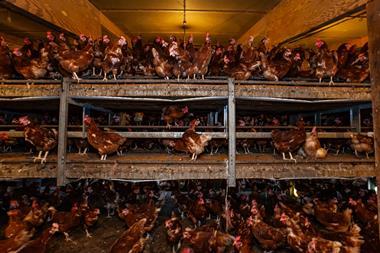
The Food Standards Agency has been accused of breaching Cabinet Office principles over its “misleading” consultation on precision-bred organisms.
Farming groups have filed a formal complaint against the FSA over its public consultation process on genetically edited precision-bred organisms, and have called for the “seriously concerning” consultation to be withdrawn.
The government agency has been running a public consultation on proposals for a new framework in England that will regulate precision-bred organisms used for food and animal feed since 8 November, as part of the Genetic Technology Act 2023, which came into force in March this year.
The post-Brexit bill changed the way genetically edited organisms in food and feed goods are regulated, making a distinction between precision breeding and genetic modification technologies.
But several farming and business groups have opposed the FSA’s plans to remove labelling and traceability from precision-bred organisms in the food and feed system, which they claim will hurt relationships between retailers and consumers.
The system proposed by the FSA would “allow the majority of PBOs to enter the marketplace without a formal application process, without labelling or assessment and without end-to-end traceability”, said the complainants – which include Doves Farm and Riverford Organic Farmers.
“It shifts the responsibility and liability for traceability and avoidance of PBO contamination away from regulatory authorities and on to businesses and other stakeholders,” they claimed.
What is precision breeding?
The government’s genetic technology fact sheet published with the bill describes precision breeding as a range of breeding technologies, such as gene editing (GE), that enable DNA to be edited “much more efficiently and precisely than current breeding techniques”.
Precision breeding technologies can make targeted genetic changes to produce beneficial traits that can also occur through traditional breeding and natural processes. This makes it different to genetic modification (GM) where modern techniques are used to insert functional DNA from an unrelated species into another species.
Examples of precision-bred products
Current GE products include soybean oil with reduced saturated fat sold in the US and a tomato sold in Japan that accumulates a chemical that lowers blood pressure. For the future, a range of wheat, chickpea, and peanut products with health benefits are in development, alongside products aimed at consumer convenience such as seedless fruits and corn that is higher in thickening starch.
How will the Act change the regulation of precision breeding?
The government said the primary policy objective of the legislation was to ensure plants, animals and food and feed products developed using precision breeding technologies are “regulated proportionately to risk”. The bill will “introduce simpler regulatory measures to enable these products to be authorised and brought to market more easily.”
GE and other new precision breeding techniques are currently regulated under the complex regime that applies to all genetically modified organisms (GMOs). EU rules on GMOs currently continue to apply in the UK, though 2022 regulations amended the rules in England for certain GE plants used for research and development.
Source: House of Commons Library, UK Government
The complaint was submitted to the FSA on Tuesday and alleged multiple breaches of Cabinet Office Consultation Principles and “serious misrepresentation of the facts” because it failed to properly explain “the nature of precision breeding and the science around its safety” and allowed little time for stakeholders to reply.
The deregulation of genetically edited PBOs and the removal of labelling and end-to-end traceability in the food system, would have “a domino effect throughout the food system”, they argued. The complaints said this would disadvantage “non-GM, organic, artisanal and natural food producers who wish to avoid PBOs, removing consumers’ right to choose whether or not to purchase and consume these foods as well as farmers’ right to choose whether to feed them to their livestock”.
The group went as far as alleging the FSA had “seriously misrepresented” the results of its own public surveys and a literature review it commissioned into detection of PBOs “in order to create a narrative designed to influence the outcome of the consultation”.
Another key concern was the “overly technical nature of the consultation materials”, which the signatories claimed created a barrier for the general public to “fully engage and contribute meaningfully”.
FSA chair Susan Jebb told The Grocer: “The FSA’s public consultation on the regulatory process for precision breeding continues an ongoing conversation around this topic.
“Over the past couple of years, we have engaged directly with stakeholders and consumers as we have developed these proposals. They have also been discussed several times by the FSA board in open meetings, the videos of which are available on our website.
“Stakeholders and the public have asked questions and received responses as part of our process of open and transparent policymaking. Our formal public consultation is the latest stage in testing and developing the proposals for a new regulatory framework.
“The consultation is being conducted in line with the Cabinet Office Consultation Principles. We look forward to receiving responses which the board will consider carefully and to further inform the recommendations we make to ministers on the process for regulatory approvals for precision-bred organisms used in food and feed.”
However, campaigners claim the consultation period – which is set for eight weeks instead of the standard 12 weeks – does not allow those impacted by the regulation enough time to comprehensively analyse and respond to it.
They also argued that the timing of the consultation over the Christmas and new year period would “mean potential respondents may not be able to engage”.
“For businesses, for instance, the holiday period of one of the busiest times of the year and a significant source of annual income,” they argued. “Cabinet Office Principles specifically advise against consultations over holiday periods.”
Read more: Why we must take a balanced approach to precision breeding
GM Freeze – a group campaigning for adequate safety regimes, transparency and regulation in the development and commercial release of genetically modified and gene-edited plants and animals – wrote to Jebb last week to ask for an extension to the consultation period for similar reasons.
“GM Freeze is particularly concerned by the chilling impact that the timing will have on participation by consumer-facing or supplying businesses during their busiest time of year,” the letter read.
“The consultation document is 29 pages long and contains technical, scientific and legal details. A substantial amount of time will be required by respondents in order to make their responses as meaningful as possible; time which is simply not available to many potential respondents over the Christmas period.”
GM Freeze executive director Leonie Nimmo told The Grocer: “It may be that distributors such as supermarkets would want to take legal advice on their obligations under the proposed new regime, including on issues such as product recalls. However, there is no way that such a business could do this and formulate a formal response to the consultation in a matter of weeks.”
The British Retail Consortium confirmed it would respond to the consultation.
Its director of food and sustainability Andrew Opie said: “There are merits in further exploring the use of GE. We are supportive of the technology and its potential to make a contribution to increased sustainability and security of food supply chains.
“However, any policy has to be developed in the context of consumer acceptability and the wider financial implications for our UK farmer suppliers.”



















No comments yet